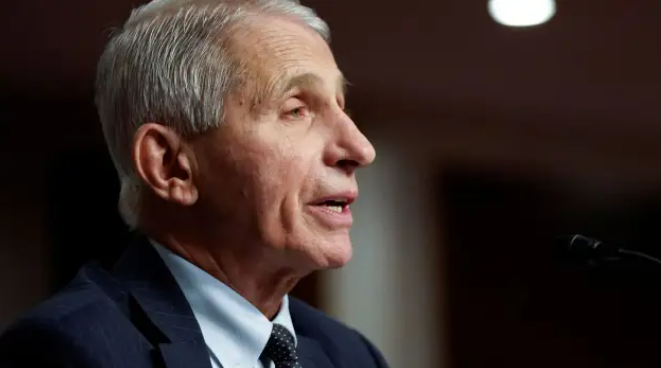“Don’t let the bastards wear you down.”
That phrase, instilled in Dr. Anthony Fauci when he was a student at the Jesuit-run Regis High School in New York City, might as well be the motto of his professional life.
Even though he chose a career centered in science, medicine and public health, controversy has always had a way of finding him, even as he tried to make it constructive.
Fauci chronicles many such moments in his new memoir, “On Call: A Doctor’s Journey in Public Service.”
Fauci was in the public eye for decades as the director of the National Institute of Allergy and Infectious Diseases at the National Institute of Health, but he became a veritable household name at the start of the Covid-19 pandemic as part of the White House Coronavirus Task Force, which was charged with monitoring and mitigating the spread of the virus.
Fauci spoke frequently to the worried and bewildered American public at government news conferences, giving status updates and offering guidance on face masks, social distancing, school closures, hospitalization rates and, eventually, vaccines. Many credit him with helping the country navigate the uncharted waters of the coronavirus crisis with his medical expertise, calm demeanor and signature Brooklyn-tinged gravelly voice.
At the same time, Fauci was navigating his own political headwinds – some from his boss, former President Donald Trump, who tried to play down the threat of SARS-CoV-2 even as he initiated Operation Warp Speed, the $10 billion-plus public-private partnership focused on rapidly developing vaccines as well as therapeutics.
Fauci described how “painful” it was at one point to correct Trump about hydroxychloroquine to prevent Covid-19 during a news conference early in the pandemic, a move that upset some of the President’s aides.
But Trump’s attention was elsewhere, Fauci said: When he called the doctor to his office, the President surprised him by talking about how many people were watching the news conferences.
As the pandemic continued, many coronavirus deniers, conspiracy theorists and antivaxxers blamed Fauci personally for struggles with school closures, mask mandates and vaccine recommendations. Even now, Fauci recently testified, he still faces death threats.
Yet throughout his career, Fauci seems to have taken public criticism in stride and used it, even, to build something better. It was an attitude he learned in childhood.
“The Jesuit priests, when you thought that all of a sudden the whole world was pounding on you, they would say ‘Illegitimi non carborundum,’ which means ‘don’t let the bastards wear you down,’ which … lately, that is a very relevant and appropriate saying,” Fauci told.
Dr. Fauci said to himself, “I have a responsibility to preserve my own personal integrity and a responsibility to the American public.” … So when I walked up to the podium, I said, “Here it goes!”
That was painful to me, to have to do that, but there was no doubt that I had to do it. I mean, it wasn’t like, “Well, maybe you should, and maybe you shouldn’t.” There was no doubt that I had to do it, because I would actually be just relinquishing my responsibility. And what happened is that the President was less upset about that than the people around him, who really got upset.
But then he called me in his office once when he wanted to ask me another question, and he was looking at three different televisions, and he says, “My God, these ratings are amazing. They’re better than cable; they’re better than network.”
The President — it’s no secret. I’m not divulging a secret about the President — he was very, very fixated on image and ratings. And he thought that the amount of attention that was given to the press briefings was really terrific.
And his comment was, “Wow, do you see those ratings?” And my feeling was, “The ratings are in the middle of a pandemic.”



